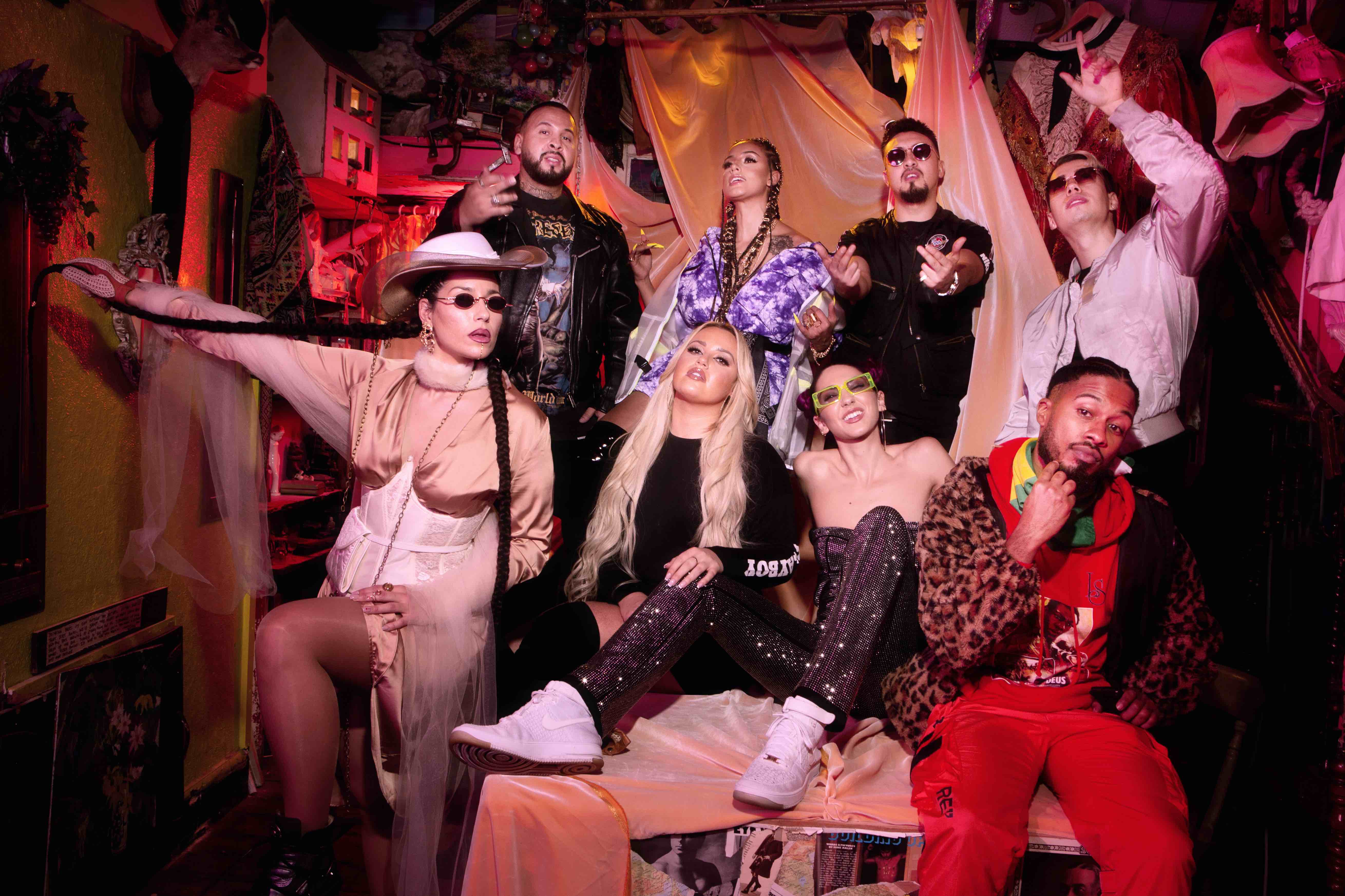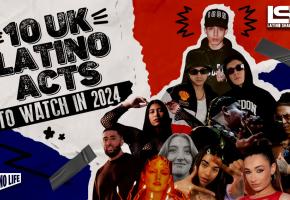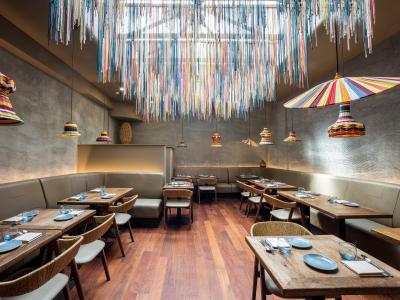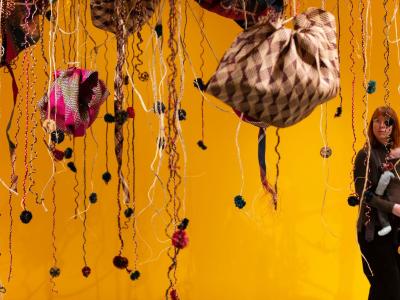Sheltering from Dalston’s looming November clouds, Latin London’s brightest young musicians pose boldly in colourful photos for the first magazine cover of their budding careers. A carnivalesque atmosphere pervades, as Spanish, English, and a myriad of sounds, from salsa to cumbia to reggaetón, buzz around the room. Facing the closed doors of lockdown again, they only aim to grow wiser, their dreams merely clarified, as they anticipate creating an urban Latin music explosion, with the capital as its vibrant centre.
Sachellys, Desta French, Amber Donoso, Daniela Brooker, Dukus, Angelo Flow, Anansi and Guala, all born or brought up in the UK but with roots firmly in Latin America, are keenly aware that the sounds they grew up with have been steadily making their way into the global mainstream.
This goes beyond hits like ‘Despacito’ and ‘Mi Gente’, which topped the UK charts three years ago. It also transcends the numerous global hits that have taken influence from ‘tropical beats’, such as Ed Sheeran’s ‘Shape of You’, or Lethal Bizzle’s ‘Fester Skank.’ In the last two years, urban Latin music from the likes of Bad Bunny, Cardi B, Ozuna or Maluma are among the most streamed and most viewed in the world.
When it comes to the UK, for the first time ever, according to London’s pioneering reggaetón DJ and promoter, Jose Luis Seijas, “we are seeing the development of a UK urban Latin sound that is characterised by its authenticity.”
Fusing home-grown grime and afro-swing with a distinctly Latin sabor, Britain’s new Latin generation has more confidence in the uniqueness of its own sound and in singing in its own language, says Jose Luis. “It’s a transition similar to what British black music went through, which used to be heavily influenced by US hip hop and R&B but is now all about its own unique sound and beats. British-Latino kids today are no longer just importing Latin music and playing it here, they are making new music born of their influences growing up as Latinos in London.”
 DJ Jose Luis
DJ Jose Luis
Venezuelan-born Jose Luis, who came to the UK 20 years ago, has been part of this transition, after bringing reggaetón to the UK back in 2005 with his now legendary party La Bomba at Ministry of London and SE1. Back then it was Daddy Yankee and Tego Calderón making the hits, empowering Latinos with their boldness. Indeed, Jose Luis himself admits, ‘it was Calderón that really got me into reggaetón. Before that, salsa music was our street music and had a massive impact across the Americas, as well as other US-Latino innovations, such as Latin house or electronica.’
Whilst some of the effects of this may have been seen in the UK in the form of momentary hits, music in Spanish was generally relegated to the ‘exotic’ or ‘fun’, rather than the genuinely valuable (one needs only look as far as ‘Living La Vida Loca’, or ‘Mambo No. 5’.) This is something that the new generation of London artists all hope to change.
So, what exactly is this fuego that is starting to rise, and what is its significance for the Latino diaspora in the UK?
London’s Spanish and Portuguese speaking population is one of the fastest growing migrant communities in London, an estimated million, with two-thirds having arrived since 2000, according to Trust for London. At first, they ‘were lying low and working like donkeys to create a better life for their kids,’ illustrates Amaranta Wright, director of Latino Life media and events. However, more recently, ‘these kids have been making their mark on London’s cultural life, most notably on the club scene, through the spread of increasingly popular Reggaetón parties.’ With the first generation of Latin-Londoners coming of age, and a climate of increased Latino visibility in the worldwide media, there is a growing feeling of empowerment.
“In school I remember being conscious of how different my body was compared to all my friends.” Says British-Venezuelan Daniela Brooker, who was recently named on Billboard magazine’s list of 17 Latina Artists to Discover During Quarantine. “My mum would just laugh ‘don't worry, you’re like JLO!’”
“People are attracted to what makes them feel good . . . and Latin American music has such a positive, happy vibe,” says Sachellys, a young British-Colombian artist, whose song ‘Pa Mi’ has over 1 million hits on YouTube.
 Danial Brooker, Sachellys
Danial Brooker, Sachellys
Whilst originally singing or rapping only in English, all these artists say that they only truly found their ‘voice’ when they started singing in Spanish or, in the case of Anansi, Portuguese.
“We all by chance started writing in our languages, thinking that no one else was doing it,’ adds Sachellys. ‘But we were all actually doing it at the same time, which is a bit mad.’
Desta French’s song ‘Aguanta’ particularly highlights the vibrancy of fusing a Latin-sounding guitar lick with a drill-like drum beat and Spanish lyrics celebrating endurance, freedom, empowerment, and faith in Pachamama, an Andean goddess of nature. “London’s diversity makes you want to be more experimental and innovative as a musician,” she says, expressing the desire found amongst all these artists for collaboration and a shared collective movement.
For Jose Luis, the UK’s diverse music ranging from “Stormzy, Giggs and Wiley, to punk, garage and just about any other genre,” leaves young creatives with an endless source of inspiration.
But there are also stereotypes that these musicians still have to battle. South-London producer and artist Dukus laments the frequent comments about his native Colombia, Pablo Escobar, cocaine, and machismo, as well as the stereotypes of Latins in the UK. ”Not all Latinos in London have a stall at Seven Sisters market,” he laughs.
“The narrowness with which people view each other’s cultures is a hinderance,” agrees Desta and Sachellys adds: “Latin America is so diverse, so rich, but people’s view of it is just so narrow. . .these are things I want to get out of people’s heads through my music.”
 Dukus, Desta French
Dukus, Desta French
In the music industry at least, global trends are undeniable and perceptions are beginning to change assures Dukus, who has just landed a deal with British DJ Charlie Sloth, the UK’s biggest Urban DJ: “Charlie said to me… ‘I don’t care if it’s Spanish…it’s fire!’ Charlie recognises that there is a big appetite for it and the internet has meant that people in the UK are increasingly open to new music, even if it’s in another language.”
Whilst a significant portion of the artists come from London’s large Colombian population, they hail from diverse lands, from the Dominican Republic to as far as Chile, as in the case of Amber Donoso. “I spent half of my childhood on a farm in Chile with my father and the other half with my mother in London,” she explains. “After my father passed away and I was spending more and more time in the UK, I started to notice how much I missed that culture. I didn’t have any Latino friends in the UK and recently realised how much I needed it. Being a reggaetón artist is an amazing way to be able to share our culture and music. I feel Latina through and through. From my personality to the way I dance and perform.”
Guala, both a rapper and youth worker in North London, takes pride in his Ecuadorian heritage, explaining that his country “has its own accent, its own slang, and its own humour.” Having grown up both in Tottenham and an organic farm in Ecuador’s Ambato, it would be hard to find someone who could bring across such a unique viewpoint. “Maybe that’s why my rapping is lightning fast - I feel I have to bring across as much as I can during my time on a beat!”
Anansi, of Brazilian, Guyanese, and Surinamese heritage, in colourful leopard-print clothing and with a bottle of rum in hand, explains to me that he is “black, but not Caribbean and not African.” Anansi sings and raps in Portuguese, English, and Spanish, and identifies as Afro-Latino, which pretty much makes him invisible on any official UK form (which still don’t recognise ‘Latino’ or ‘Latin American’ as an ethnicity or identity),
In his music, Anansi celebrates energetically the life that he has led so far, drawing on themes ranging from Brazilian favelas to Guyanese jungles and parties. “Imagine being an Afro-Latino in the UK; you’re not going to be able to just go on YouTube and find a similar artist, or an audience who can relate to where I’m from” he explains, adding this uniqueness can both be a blessing or a burden. “I can be that reference for anyone from a similarly weird background.”
 Anansi, Angelo Flow
Anansi, Angelo Flow
Uniting all these artists is a desire to put the UK at the centre of a global Latin music phenomenon by drawing on the unique sound of Latin London. For Jose Luis, who has just received Arts Council funding to continue nurturing Latin talent in the UK, including his annual showcase ‘La Raza’ at La Clave Fest, the UK’s biggest free Latin festival, in Finsbury Park, it’s down to recognition from wider UK media and institutions. “Many of the artists have enough talent, and it is just a question of support and backing.”
As another lockdown closes in, these young artists will go back to their studios and bedrooms, promising collaborations, mixtapes, videos, promotions, and even more music. All of them have music coming out - a forthcoming EP from Anansi, Amber Donoso and Angelo Flow, from Guala, a mixtape (‘Todo Eso’) in March next year.
Despite the dificult times, they are all looking to the future: “We want a full-on scene,” outlines French, Anansi adding that ‘if the scene blows up…us artists will all go up with it’. In the eyes of these musicians, their genre is destined to explode. “It’s going to be huge”, anticipates Sachellys, “watch out for us!”
As I leave the shoot, walking back out into the cold London air, I feel energised by this pulsating Latin American energy, and can only hope that what is next for them is as big as they dare to think it will be.
Set design by Tony Hornecker. Styling, make up and jewellery by Juliana Caviedes. Extra Make Up Luisa Balcazar. Accessories by West Carolina.
















